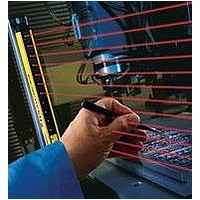QDE-825D BANNER ENGINEERING, QDE-825D Datasheet - Page 31

QDE-825D
Manufacturer Part Number
QDE-825D
Description
Safety Light Curtain
Manufacturer
BANNER ENGINEERING
Datasheet
1.QDE-815D.pdf
(74 pages)
Specifications of QDE-825D
Light Curtain Type
Safety
Accessory Type
Machine Interface Cable
For Use With
EZ-Screen Safety Light Screen
EZ-SCREEN
Instruction Manual
Mount the reset switch in a location that complies with the warning
in Section 3.1.3. See Section 3.3.2 for electrical connection.
Connect the QD connectors and route the sensor cables to the
junction box, electrical panel, or other enclosure in which the
Interface Module, the redundant mechanically linked interposing
relays, FSDs, or other safety-related parts of the control system
are located. This must be done per local wiring code for low-
voltage dc control cables and may require installation of electrical
conduit. See Section 2.2 for selection of Banner-supplied cables.
EZ-SCREEN is designed and manufactured to be highly
resistant to electrical noise and to operate reliably in industrial
settings. However, extreme electrical noise may cause a random
Trip or Latch condition; in extreme cases, a Lockout is possible.
Emitter and receiver wiring is low voltage; routing the sensor
wires alongside power wires, motor/servo wires, or other high-
voltage wiring may inject noise into the EZ-SCREEN System.
It is good wiring practice (and may be required by code) to
isolate emitter and receiver cables from high-voltage wires,
avoid routing cables close to “noisy” wiring, and provide a good
connection to earth ground.
Sensor QD cabling and any interconnect wiring should meet
the following specifications. The wires used should have an
insulation temperature rating of at least 90°C (194°F).
* QDE-...D cables, see table 2.2
NOTE: Maximum cable lengths are intended to ensure that
See Section 7.4 for cascade installations.
3.2.2 Mounting the Reset Switch
3.2.3 Routing Cables
Electrical hookup must be made by Qualified Personnel
and must comply with NEC (National Electrical Code) and local
standards.
Make no more connections to the EZ-SCREEN System than are
described in Sections 3.3.1 through 3.5.3 of this manual.
Connection of other wiring or equipment to the EZ-SCREEN
System could result in serious bodily injury or death.
22 AWG*
Banner Engineering Corp.
Banner Engineering Corp.
18 AWG
20 AWG
www.bannerengineering.com • Tel: 763.544.3164
www.bannerengineering.com • Tel: 763.544.3164
WARNING . . .
adequate power is available to the EZ-SCREEN System
when the supply is operating at +24V dc – 15%.
versus total current draw (including both OSSD loads)
Maximum Machine Interface cable length (ft)
0.5A
375
240
150
0.75A
250
160
100
•
•
Minneapolis, U.S.A.
Minneapolis, U.S.A.
Proper Electrical Hookup
1.0A
188
120
75
1.25A
148
95
59
1.5A
125
80
50
1.75A
109
70
44
Lockout/tagout procedures may be required (refer to OSHA
29CFR1910.147, ANSI Z244-1, or the appropriate standard
for controlling hazardous energy). Following relevant electrical
standards and wiring codes, such as the NEC, NFPA79 or
IEC60204-1, always connect earth ground (green/yellow
wire, see Figures 3-20 through 3-23). Do not operate the
EZ-SCREEN System without an earth ground connection.
See the warning below.
Make the electrical connections in the order described in this
section. Do not remove end-caps; no internal connections are to
be made. All connections are made through the M12 Euro-style
quick-disconnects.
When installing QD cables, do not use tools to tighten the
coupling nut (i.e. hand-tighten only). Do not rotate the body of
the QD, or damage to the connector can occur.
Emitter Cable
Standard EZ-SCREEN emitters have an 8-pin cable, but only
three conductors are used (Brown = +24V dc, Blue = 0V dc,
Green/Yellow = GND). The other wires are in place to allow a
parallel connection (color-for-color) to the receiver cable (see
Figure 3-19), providing sensor interchangeability (or swapability);
either sensor may be installed at either cordset connection.
In addition to providing similar cabling, this wiring scheme is
advantageous during installation, wiring, and troubleshooting.
Emitters with the optional TEST function (model number suffix
Q5) use a 5-pin cable (see Figure 3-20). Locate the black and
the white wires at the cable end; if the Test input will be used,
temporarily connect the ends of the wires to each other (but not
to an external contact at this time). If the Test input will not
be used, connect the emitter cable black and white wires
together and properly terminate (e.g., with the included
wire-nut).
Receiver Cable
Do not connect any wires to the machine control circuits
(i.e., OSSD outputs) at this time. For the initial power-up and
checkout, NO EDM must be configured. Locate the orange and
orange/black wires (pins 2 and 3) and temporarily connect the
ends of the wires to each other (but not to the machine at this
time). Take precautions to prevent the wires from shorting to
ground or to other sources of energy (e.g., terminate with the
included wire-nut). Final EDM wiring must be completed later.
If used, connect the external reset switch to the reset wire
(violet) on the receiver cable and to 24V dc (see Figures 3-21
and 3-23). See warning in Section 3.1.3 about the physical
location of the external reset switch. The reset switch must be
a normally open switch that is held closed for approximately 1/4
second, but no longer than 2 seconds, and then re-opened to
accomplish the reset. The switch must be capable of switching
10 to 30V dc at 30 mA.
3.3 Initial Electrical Connections
Installation and Alignment
Overview
P/N 112852 rev. F
P/N 133487
29
29














